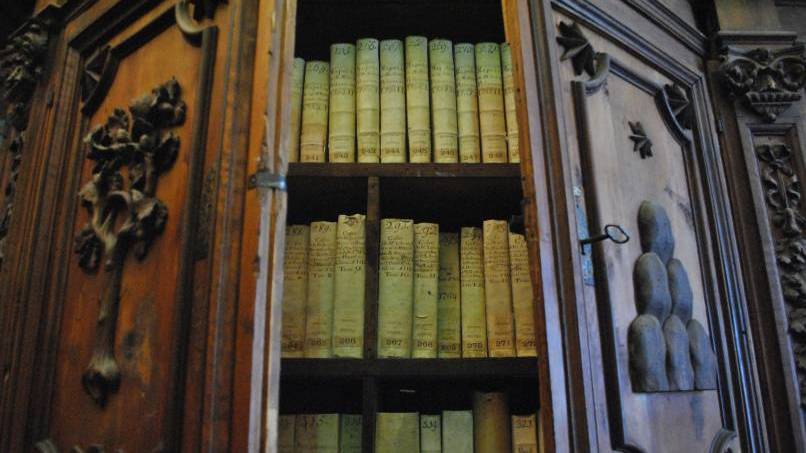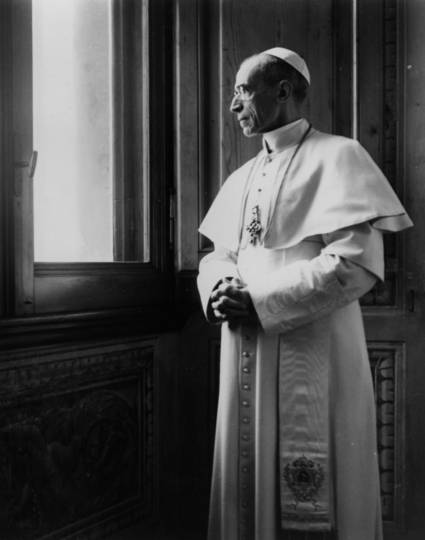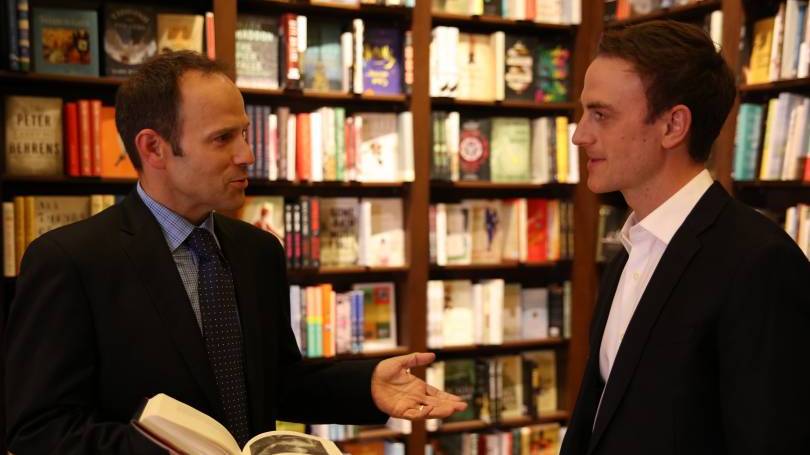What will scholars find in the secret archives of Pope Pius XII?
Salt + Light Media
Monday, March 11, 2019

Last week it was announced that the secret Vatican archives of Pope Pius XII (1939-1958) will be opened to scholars and historians for the first time in March 2020. This enigmatic historical figure has been the subject of a major moral debate since the Second World War, namely, did he do enough as leader of the Catholic Church in response to the Holocaust?To better understand this important development, S+L producer Sebastian Gomes spoke with Pius XII scholar Robert Ventresca of King’s University College at Western University. Robert is author of Soldier of Christ: The Life of Pope Pius XII, which was featured in season one of S+L’s book show Subject Matters.
During a recent meeting with employees of the Vatican archives, Pope Francis announced that the file on one of his predecessors, Pope Pius XII (1939-1958), would be opened in March 2020. What was your reaction to this news?
I reacted to news of the full opening of the Pius archives with a measure of excitement, and relief, and maybe even some lingering disbelief. I say relief because, as is well known, the Vatican has been promising for well over a decade that the day was coming when scholars finally would be able to access records that, until now, have only been available to us in the form of selected papers that were published at the behest of Pope Paul VI starting in the 1960s. To be clear, these selected papers represent a very rich documentary record - eleven edited volumes of archival documents published as the Actes et Documents du Saint Siège relatifs à la Seconde Guerre Mondiale, (Acts and Documents of the Holy See related to the Second World War). In truth, I believe that the published papers remain under-utilized and that, taken together, they help us to understand a great deal that is essential about the Vatican’s role in, and response to, the events of World War Two. What the papers don't cover, and this is what makes news of the opening of the Pius archives so significant, is the 13 years of Pius XII’s tenure that followed the end of the Second World War; this was a tremendously significant period in the history of the Church, and the world. One of the major points of my book about Pius XII, Soldier of Christ, is that while it is entirely understandable and necessary that we focus on the dilemmas and limitations of his leadership during the Second World War and the Holocaust, we need to remember that evaluating a pontificate and its legacy also means evaluating the whole of the pontificate. And so, the archives are vital to understanding, among other things, the Vatican’s role during the Cold War, the internal developments and debates that emerged under Pius XII that helped to pave the way for the truly historic transformations of Vatican II, not to mention the Vatican’s role in the social and cultural revolutions of the post-WWII period - including changing views on the role of women in society and in the Church. In short, access to these archives represents a generational opportunity to gain a deeper understanding of one of the most controversial and consequential popes in all of history.Scholars already know a lot about Pius XII. What might the archives reveal that has up to now been obscure or unknown? Are there “missing links” in his story?
Let me put it this way. I have a long list of questions that to my mind remain unanswered or remain only partially answered by the documentation made available to us to this point. Some questions are very general, relating to the pope's rationale and decision-making, especially in the diplomatic arena and in the realm of world affairs. Other questions are very specific questions, relating in particular to what the pope and his advisors knew about the Holocaust – the systematic murder of Jews at the hands of the Nazis and their collaborators across Europe – when they knew it, and what they did or didn't do in response. For example, for a long time now, and even during the war itself, the pope and his advisors insisted that Pius XII and Vatican-related officials and entities were working quietly behind the scenes to provide concrete assistance to persecuted Jews. The evidence we have to date does help to substantiate that claim to some extent but not nearly enough to be able to provide a full and definitive picture of just how much papal assistance was offered, or of how effective this assistance was in concrete terms.
Pius XII is an enigmatic historical figure, the subject of what has come to be known as “the Pius wars”. Disagreement remains over his legacy during World War II. Some commentators have condemned him as “Hitler’s pope” for remaining silent publicly to Nazi crimes. Others have commended him as a “righteous gentile” for working diplomatically behind the scenes to end the war while saving Jews in Italy. What should an ordinary person make of these vastly differing depictions of Pius?
As I write in my book and as I repeat every time I am asked to speak about Pius XII, I would tell interested members of the public to think of these starkly differing versions of Pius XII as caricatures of the man, as exaggerated and distorted interpretations of a complex historical figure. They tell us more about what those who subscribe to either depiction want to believe about Pius XII, rather than about the pope himself, or about what he did and didn't do during World War Two. As I say in my public talks about Pius XII, to speak of him as either “Hitler’s pope” or as a “righteous gentile” really is to practice mythic history rather than critical history. It is to employ a rhetorical label that tries to force the historical evidence and argumentation into a pre-determined conclusion about the kind of leader Pius XII was, or the kind of leader some people wish he had been. At the risk of sounding self-promoting, I would encourage the interested Salt and Light viewer and reader who is unsure what to make of these differing depictions to consult the works of professional historians: to read good, sound, scholarly history about the subject – and there is a lot of this available! It’s not that we historians have all the answers or that we are always right. We often get it wrong or can offer at best a partial and selective depiction of the past. That is inescapable since we always are working with documentation that is partial and fragmented at best. And of course, even serious scholars disagree about Pius XII's role and his legacy. My point simply is to encourage interested members of the public to think about Pius XII's role during the war in an objective, factual, empirical way: to look at the evidence that we have to date and to make their judgements based on the arguments they think are both factually based and backed up by sound interpretation, rather than alluring but superficial, eye-catching titles or polemical claims.
In his address to the employees of the Vatican archives, Pope Francis said, “The Church is not afraid of history; rather, she loves it, and would like to love it more and better, as God does.” History does not always shine favourably on the Catholic Church. What do you make of Pope Francis’ statement?
Pope Francis echoes here what many of his predecessors have said, going back to Pius XII himself! It certainly echoes the consistent view of his most recent predecessors, including John Paul II and Benedict XVI, both of whom insisted that the Church had nothing to fear from history; to the contrary, that the Church yearns for the truth and loves it. To that I say, Amen! But here's the thing. It is vital now to follow up words with deeds. We have been hearing for decades now that the Church does not fear what history may reveal about the Vatican’s wartime role, for instance, and its response to Nazism and the Holocaust. And yet it has taken much longer than expected, or than was necessary, to make the Pius archives widely available to researchers. I would say it has taken far too long, in fact, and this has only challenged the credibility of claims that the Church is not afraid of historical truth. It is true that the Church's long history, even its most recent history, is filled with terrible, scandalous wrongs and injustices against individuals and communities. But to hide from or to deny this history is to perpetuate and aggravate the wrong. As I say repeatedly when asked about the Pius archives and the historical record, the Church needs to practice what it preaches when it says, in the spirit of the Gospel, that we are called to “know the truth”; that we are to love the truth for it shall “make us free”. In reality, too often in the Church's history, great harm has come to individuals and to the Church's own credibility when it fails to practice what it preaches. When it preaches love of truth and confession of sin, conversion of heart and so on, but then practices secrecy and obstruction and lack of transparency at the highest levels of institutional power. All of which is to say that I welcome Pope Francis' statement and look forward to seeing the spirit and letter of this declaration applied to the life of the Church, past and present.Do you plan to travel to Rome to study the archives for yourself?
Short answer: yes! It will be some time until we know for certain the specific access dates or how the Vatican archives will organize the logistics around what is sure to be a surge in demand for access to fairly limited space. Regardless, sign me up, as they say! I have my passport ready, as well as my list of pointed questions to help me navigate this vast treasure-trove of documentation. For historians, it truly is a once-in-a-generation opportunity that will keep us busy for many decades to come.Robert A. Ventresca Associate Professor of History King’s University College at Western University in London, Ontario (Canada) Member, the College of the Royal Society of Canada
Want to hear more from Robert Ventresca on Pope Pius XII?
Watch this interview from 2016 on Subject Matters!
Related Articles:
Category: Featured, General Posts
Tag: archives, Holocaust, Pope Pius XII, Pope Pius XII and the Holocaust, Vatican Secret Archives, WWII
My Manresa Story: Resting a While
Monday, February 24, 2025
 Gianpaolo Capozzi
Gianpaolo Capozzi
At the Manresa Spiritual Renewal Centre in Pickering, ON, retreatants of all ages can encounter a God of surprises.
A House Not Made With Hands: St. Anne’s Anglican Church
Friday, February 21, 2025
 Scott Harris
Scott Harris
In June, 2024, the domed roof and interior of St. Anne's Anglican Church in Toronto tragically burned down. However, the parish community continues to stand strong and serve its neighbourhood.
Pray with Pope Francis Reflection – February 2025
Friday, February 7, 2025
 Fr. Edmund Lo, SJ
Fr. Edmund Lo, SJ
Pope Francis invites us to pray for vocations to the priesthood and religious life, that the ecclesial community might welcome the desires and doubts of those young people who feel a call to serve Christ’s mission in the priesthood and religious life.
Visit local pilgrimage sites this Jubilee Year
Thursday, January 30, 2025
 Maria Montemayor
Maria Montemayor
For the Jubilee of Hope, there are designated local pilgrimage sites in every country, and Canada is no exception. How is a local pilgrimage site determined? The local bishop can designate any parish, shrine, or basilica in his territory as a Jubilee Year pilgrimage site.
Creating Catholic streetwear
Thursday, January 9, 2025
 Maria Montemayor
Maria Montemayor
Fashion and clothing designed to draw people closer to God can inspire and even sanctify others. Nate Nagello, the CEO and owner of the Toronto-based Sanctified Collective, hopes the clothing he creates can provide opportunities for conversation, engagement, and evangelization.













